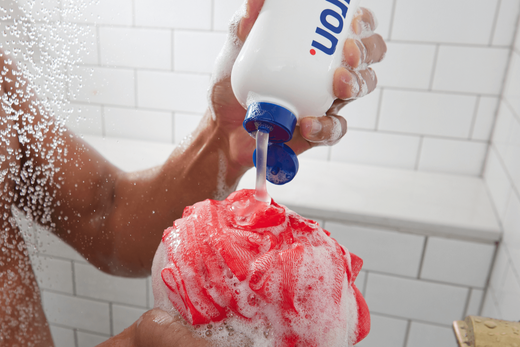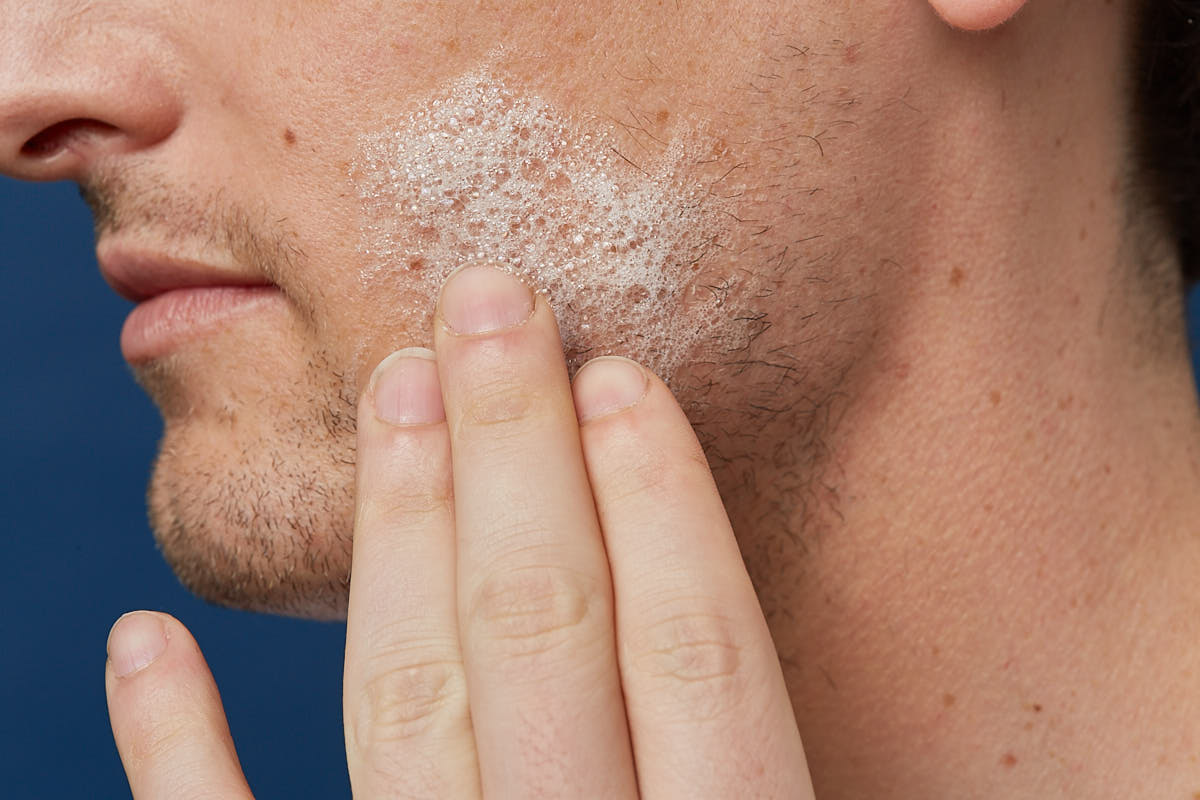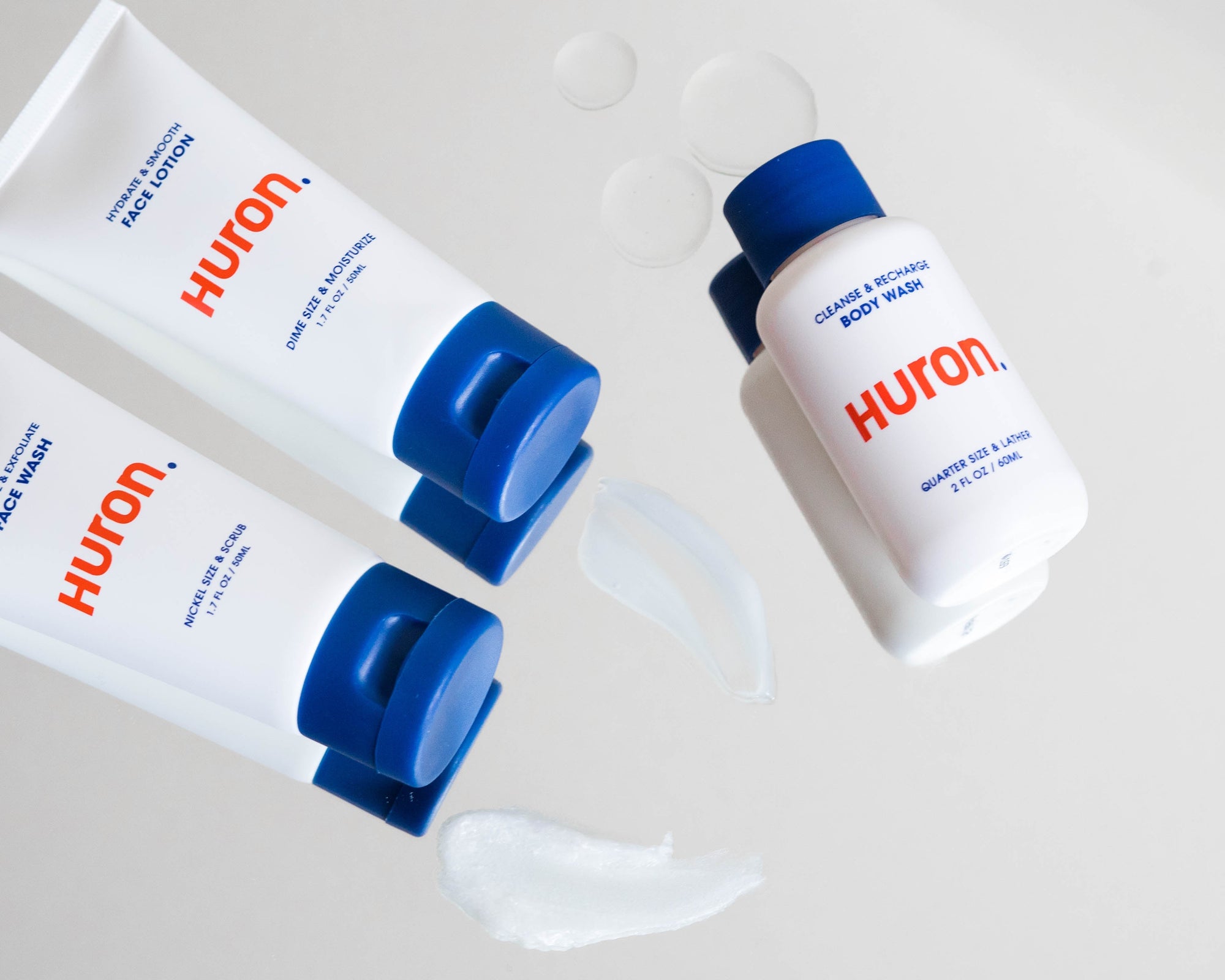Believe it or not, you've got a lot of skin. Spread out, it would cover about 22 square feet. Shrink-wrapped onto your body, it’s literally all that’s holding you together.
While you may not think about it much, skin is necessary for your overall health. It keeps moisture in and keeps germs out. Plus, it’s the body’s primary protection against DNA-damaging UV rays and toxins from pollution and the environment. So, yeah, it’s really important.
But let’s face it. A lot of men just aren’t that into caring for their skin. We tend to focus on eating right and exercising to improve our fitness—and that’s true regardless of whether you’re an Iron Man contender or a weekend warrior. Skin is ignored until there’s a problem, and even then, a lot of us don’t really know what to do about it.
We’re going to change all that. Let’s start with a look at how skin works, and what kinds of things wear it down. Then we’ll learn why a simple skincare routine can make a big difference for healthy skin.
Why is it important? When you look great, you feel great. It’s that simple.
Skin Biology (Cliffs Notes Version)
Every person’s skin is made up of a few key layers. Deep down is the dermis, then comes the epidermis, and at the very surface is the stratum corneum.
About every 30 days, new skin cells are produced in the epidermis layer and they migrate towards the surface. On the way up, they flatten out and lose their nuclei, leaving behind a densely packed layer of dead cells. When these dead cells reach the outer surface, they naturally flake away.
The surface layer is vital to healthy skin. It is surprisingly thin, only about 15 cells deep. When it is in good shape, it is tightly packed with skin cells and natural oils. (Think of the cells as bricks in a wall and the oils as mortar. Together they form a strong protective layer called the moisture barrier, which is what keeps hydration inside your skin.) It’s basic chemistry: since oil and water don’t mix, water can’t pass through the oil-based moisture barrier on it’s own.
When skin is hydrated and healthy, it works like a well-tuned factory. It pumps out collagen to stay firm, maintains hydration levels, repairs damage and renews the moisture barrier to keep its defenses strong. Skin is in perfect balance—but of course, it doesn’t always stay that way.
Everyday Skin Challenges
A lot is riding on that moisture barrier. It’s strong and effective, but also thin and vulnerable. Simply not drinking enough water can start to dehydrate skin from within. Harsh cleansers, designed to get rid of dirt and oil, may also strip away the necessary oils that make up the moisture barrier. This leaves weak areas where water can start to evaporate and irritants can start to penetrate. Pretty quickly, these effects can lead to a downward spiral. Dehydration slows down the whole factory, leading to an even weaker moisture barrier and further water loss.
External factors like the sun’s UV rays and blue light can also damage skin. And while avoiding skin cancer should be enough of a reason to wear sunscreen, those UV rays can also wreak havoc with skin’s healthy, youthful look. They penetrate deep within skin to cause irritation and damage that looks like lobster-red sunburn now, but may develop as weakened skin (yes- lines and wrinkles) and dark spots down the road.
Other environmental irritants such as pollution, cigarette smoke and ozone, can also damage skin. These are all sources of highly reactive chemicals called oxidants, which can rip through skin like a bull in a china shop, causing all kinds of damage. Think of an apple turning brown, or iron turning to rust. In both cases, oxidants in the environment are causing that damage.
Now, let’s be real: all of these effects are happening on a cellular or even molecular level, and they might not become visible for a long time. But each little bit adds up over time, and the more you can address these skin challenges as or even before they occur, the better.
There’s another threat to healthy skin that you can definitely see and feel as it’s happening: acne. While acne is a complicated condition (and a profound challenge for some sufferers), the average zit is caused by bacteria on skin, and the build-up of dead skin cells that should have flaked away...but didn’t. Acne affects both men and women, but for different reasons. Men’s skin has more oil glands and produces about 3 times as much oil- this excess often leads to facial blackheads and blemishes as well as “backne” and blemishes on the chest and other areas.
Men’s Skin vs. Skincare (and men's skin vs. women's skin)
Compared to women’s skin, men’s skin is thicker, tougher, and rougher. It has more sweat glands, more hair follicles and more oil glands. These factors can make men’s skin less affected by early signs of aging. But it’s also more prone to breakouts and shine. And when it comes to skincare products, men’s skin is harder to penetrate.
You might think the higher oil levels in men’s skin would call for stronger cleansers to get rid of the excess. But as we learned, stripping away the moisture barrier with a harsh cleanser just makes everything worse, and can actually increase oil production. So the best cleanser will strike a balance between cleansing power and gentleness.
Creating skincare for men takes a special knack, too. You need to use higher levels of key ingredients to reach within skin’s surface, and there’s some advanced chemistry required to get past the moisture barrier and deliver the goods where they’re needed.
How Does Shaving Affect Skincare?
For a lot of guys, shaving is the closest they get to skincare. And that’s not all bad. Shaving automatically exfoliates the top few layers of dead cells, which encourages natural skin turnover, so you see fresher skin with a healthy, youthful look to it.
On the other hand, shaving often leads to razor burn and ingrown hairs. A high-quality shaving cream or gel can minimize razor burn by helping blade glide over the skin rather than tugging. Using a gentle touch and a sharp blade are also important.
Ingrown hairs normally occur when a hair gets cut off just below the skin surface, at a sharp angle. As the hair grows, the tip gets caught under the skin, causing irritation or inflammation. Tough, thick beard hair is especially susceptible to this. Again using a good shaving product and proper shaving technique will help. Exfoliating your skin can also free the hairs before they get stuck.
The Daily Routine for Men
Now you know a little about how your skin works, and where its weaknesses are. Your daily skincare routine is how you fill out the defenses to keep your skin strong and healthy looking, all in just a few simple steps.
Cleanse
You already know the trick here: strike the balance between strong cleansing and gentleness. Ideally you’d wash your face twice a day, but at least once a day is a great start. For your body, the same holds true- rid skin of dirt, oil, sweat and bacteria and keep it conditioned, smooth and healthy.
Huron Solutions: Body Wash, opens in a new tab and Face Wash, opens in a new tab
Shave
Find what works for you. The smoother the skin to start, the easier the shave. Start out with a good cleanser and mild exfoliator to help your chances and use emollient ingredients to help with razor glide. After shaving, skin should feel smooth but not irritated, and you shouldn’t have too many ingrown hairs. A thorough rinse with cool water, then seal it up with a lightweight, hydrating moisturizer.
Moisturize
Find a formula that floods skin with hydration but also helps rebuild the moisture barrier. Ingredients like sodium hyaluronate work like moisture magnets to help keep skin well hydrated. And since skin needs to breath, avoid heavy or pore clogging textures that can further trap dirt, oil and dead dry skin cells.
Huron Solution: Face Moisturizer, opens in a new tab
Eyes
Even for guys, the skin around the eye area is the thinnest anywhere on the body—which is why it’s the first place to show signs of late nights, early wake up calls and little lines. Choose an extra gentle formula created specifically for this area and look for something to strengthen skin and help with puffiness and dark circles. Those are among the most common eye concerns for men.
Huron Solution: Eye Stick, opens in a new tab
Sunscreen
Even when it’s cloudy. Even in winter. Even when you don’t think you’re going to be outside for long. The sun’s UV rays are thought to be the #1 cause of skin aging. UVA (Aging) and UVB (Burning ) rays are just two types of ultraviolet light on the spectrum. There’s also visible light (yes, blue light from smartphones and computer screens) that can cause damage to the skin. Look for broad and full-spectrum sunscreens for the most complete protection.
Make caring for your skin a habit just like you care for your teeth, your car and your golf clubs. Those few extra seconds will boost your confidence all day. You’ll look and feel healthy, even when it’s time for up close and personal.





